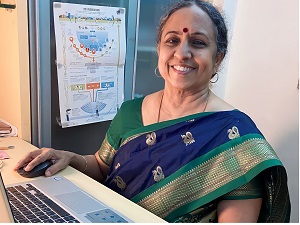|
|
|
|
|
|
September 2025
What do we have for you this month?
|
- CEO Speaks
- From our Blog
- Useful articles
- Our Lectures / Workshops
- QMedCourses News & Testimonials
|
|
|
From our CEO
|
|
|

|
Recently I came across a post in LinkedIn, where the author of the post Dr Rahul Gopal shared an image of an article in a journal of a prestigious publishing house. The introduction began with "Certainly, here is a possible introduction to your topic...." And Dr Gopal writes about how the author has obviously used AI to write. But not just that, - there had been no checking, and the peer reviewers and editor/s apparently let this slip by.
|
My thoughts wandered to more than two decades ago when I was invited to attend a meeting of Editorial board members of several medical journals in Mumbai. It was an informal event running through two afternoons. Important to mention - this was just before Internet access became public and the Internet itself was at a rather nascent stage.
|
Every member present shared the challenges that their journals were going through, in terms of getting high quality articles. A lot of brainstorming was done to see how the situation could be made better. Towards the end, the group invited Dr Sunil Pandya to share his wisdom. For those who have not heard of Dr Sunil Pandya - he was a Neurosurgeon, ethicist, prolific writer and medical historian. He was the head of the Department of Neurosurgery at the Seth GS Medical College & KEM Hospital, Mumbai, and founding editor of the Indian Journal of Medical Ethics.
His answer was crisp - he was not a man who minced words. He said, "I will give you the answer, but it is not practical" - and went on to list:
|
- About 90% of Indian journals must close down.
- Their topics should be absorbed by the other 10% of Indian journals
- Every issue must accept only top articles, which means an issue might have only one or two articles
- When all these journals show that they mean business, only then we can really improve!
Of course he then added the problems - that no journal would get advertising revenue etc. The meeting ended with people having got some solutions, but certainly not all.
Recently, I shared the above with a good friend - Dr Supten Sarbadhikari. He said "Today I will say that this is applicable for many non Indian journals too!"
|
Food for thought!! This example shared by Dr Gopal emphasizes it further. And I wonder - if Late Dr Sunil Pandya read this - how he would cringe!
Note: the article that was mentioned at the start has apparently been later retracted
|
|
|
|
|
|
From our Blog
|
Faculty, Freelancers, and Fairness: Rethinking How We Value External Experts
|
In academia and healthcare, inviting external experts to speak or facilitate sessions is a common practice. These engagements add richness, new perspectives, and practical value to learning.
But it is worth reflecting:
Do our systems of honoraria and reimbursements really acknowledge the different situations of invited faculty?
|
|
|
|
|
|
Useful Articles
- Patil AB. Attitude of undergraduate medical students towards medical research: A cross-sectional study. Natl Med J India. 2025;38156-162. doi: 10.25259/NMJI_987_2021. PMID: 40826962.
- Nath A, et al. Physicians' information-seeking, appraising, and clinical decision-making practices for drug prescriptions: an exploratory study. J Med Libr Assoc. 2025;113:224-232. doi: 10.5195/jmla.2025.2082. PMID: 40852513
- Serasinghe S, et al. Use of a Social Media Platform for Undergraduate Medical Writing: Experience From a Developing Country. Cureus. 2025;17:e87971. doi: 10.7759/cureus.87971. PMID: 40821272
|
|
|
Lectures, Webinars & Workshops
- 06th Sep- Webinar for MedicoLegal Society of India on Literature Search for MedicoLegal References
- 30th Sep – Lecture at MGM Dental College & Hospital on Literature Searching
|
|
|
QMedCourses News
|
Currently we have 7032 participants including 16 institutions and 1955 individuals registered for the courses
|
|
|
|
Testimonials for QMedCourses
Course: Information Resources & Literature Searching
|
|
This course gave me a clear, structured understanding of literature search basics, which I can immediately apply in my work and future research. The explanations were concise yet comprehensive, with practical examples that made concepts easy to grasp. The quizzes helped reinforce learning effectively. Anshan Kujur, Dept Community and Family Medicine, AIIMS Guwahati
|
|
|
|
|
|
How you can engage with us
|
|
|
|
|
|
|
|
|
|
|
|
|
|